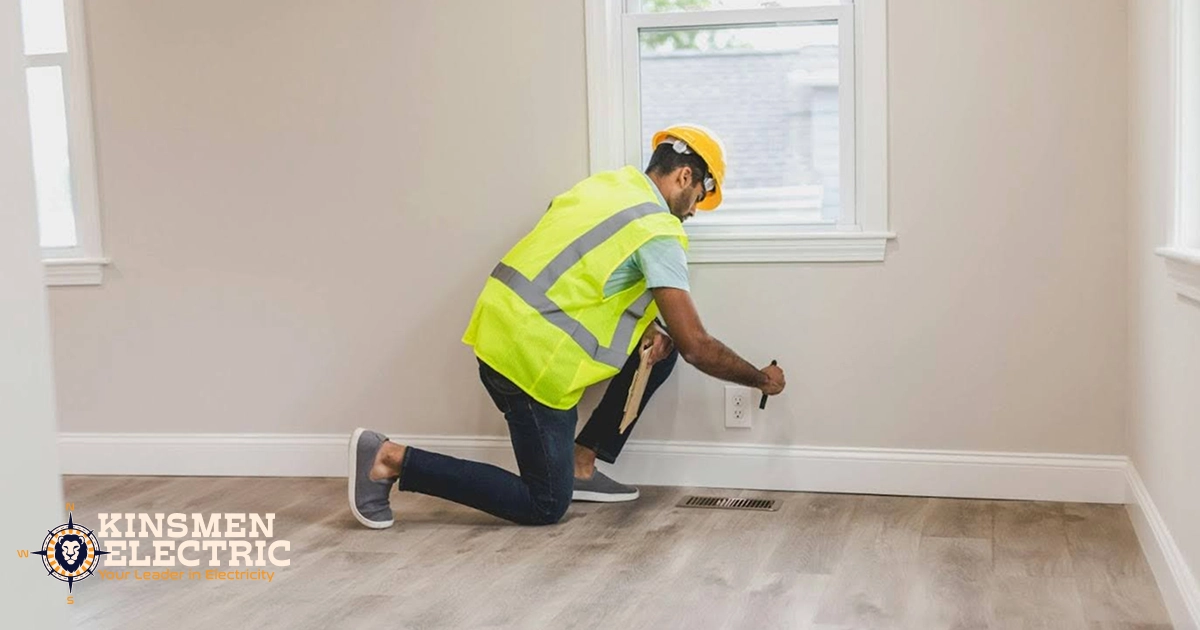As suburban homeowners, we invest time and money into our homes: keeping the lawn tidy, updating kitchen cabinets, repainting rooms. But what about what you can’t see? Hidden behind walls and ceilings, your electrical wiring might be outdated, overloaded, or deteriorating. That poses serious risks to your home and your family.
Electrical issues are one of the leading causes of residential fires in the U.S. each year. Many of these fires result from preventable problems like outdated wiring, overloaded circuits, or improperly installed electrical systems. The good news? A routine electrical inspection can catch these issues early and keep your home safe, efficient, and up to code.
Let’s walk through what a professional electrical inspection involves, why it’s necessary, and how it helps prevent costly and dangerous problems down the road.
What Happens During a Professional Electrical Inspection

An electrical inspection is more than just a glance at your fuse box. At Kinsmen Electric, we perform thorough, code-compliant evaluations to ensure your entire electrical system is safe and functional. Here’s what’s typically included in a professional home wiring inspection:
Visual Assessment of Electrical Components
- Inspecting outlets, switches, panels, breakers, and visible wiring
- Looking for exposed wires or any signs of physical damage
Panel and Breaker Check
- Verifying proper panel labeling for safety and organization
- Ensuring breakers are correctly sized and functioning properly
- Checking for signs of overheating, arcing, or corrosion
Grounding and Bonding Verification
- Confirming the system is properly grounded to protect against electrical shock
- Inspecting bonding connections to ensure safe electrical flow
Testing Outlets and GFCIs
- Ensuring all outlets function correctly and meet current code
- Testing GFCI (Ground Fault Circuit Interrupter) outlets in kitchens, bathrooms, garages, and outdoor areas
Wiring Assessment
- Checking for outdated or unsafe wiring types such as knob-and-tube
- Evaluating insulation, connection points, and the overall condition of the wiring
Energy Efficiency Review
- Identifying power drains, overloaded circuits, or inefficient components
- Offering recommendations to improve energy usage and reduce utility costs
Code Compliance Check
- Reviewing your system against the latest National Electrical Code (NEC) standards
- Verifying compliance with local building and safety codes
Common Issues Found and What They Mean

When we perform electrical safety checks, we often find problems that homeowners never knew existed. Here are some of the most common issues we uncover:
Outdated Wiring Systems
Homes built before the 1970s may have knob-and-tube systems that are no longer considered safe.
Overloaded Circuits
Plugging too many devices into one circuit can cause overheating and eventually lead to fires.
Faulty Breakers
If a breaker fails to trip when it should, it can allow dangerous levels of electricity to flow unchecked.
Loose or Damaged Connections
Loose wires or corroded terminals can result in intermittent power, arcing, or heat buildup.
Missing GFCI/AFCI Protection
These devices are now required in many parts of the home for added safety. Missing them can mean your system is not code-compliant.
Improper DIY Work
Amateur installations often lead to code violations and unsafe conditions.
Each of these issues has the potential to cause not only inconvenience but also significant danger. Early detection through a licensed electrician is the key to prevention.
How Often Should You Schedule an Electrical Inspection?

While every home is different, here are some general guidelines to follow:
- Every 3–5 Years: Schedule a routine inspection every few years as part of your home maintenance plan.
- When Buying or Selling a Home: Always get an electrical inspection during real estate transactions to ensure everything is up to code.
- After a Major Renovation: Big updates (especially those involving new appliances or rewiring) warrant an inspection.
- If You Notice Warning Signs: Flickering lights, warm outlets, frequent breaker trips, or unusual smells can all indicate a serious issue that needs immediate attention.
Benefits: Peace of Mind, Lower Bills, Increased Home Value
Why invest in a routine electrical inspection? Here’s what you gain:
- Peace of Mind: Knowing your system is safe lets you sleep better at night.
- Lower Energy Bills: Identifying and correcting inefficient usage or outdated components can help reduce your monthly expenses.
- Prevention of Costly Repairs: Catching problems early is always cheaper than dealing with the aftermath of a fire or power failure.
- Code Compliance: Keep your home in line with modern safety standards, which also helps avoid insurance issues.
- Increased Home Value: A well-maintained, professionally inspected electrical system is a selling point if you ever put your house on the market.
Why Trust Kinsmen Electric for Inspections
At Kinsmen Electric, we treat your home like our own. Our licensed electricians are trained to spot both common and complex issues that others might overlook. When you schedule a home wiring inspection with us, you get:
- Experienced, certified professionals
- Thorough inspections with detailed reports
- Honest feedback and no pressure
- Reliable recommendations tailored to your needs
- Service with integrity and a family-first mindset
We’re proud to serve our neighbors in the suburbs with high-quality electrical work that prioritizes your safety, efficiency, and comfort.
Don’t wait for sparks to fly! Schedule your electrical inspection with Kinsmen Electric today and enjoy peace of mind knowing your home is protected from the inside out.Ready to Book Your Electrical Safety Check?
Request an estimate today to ensure your home is safe, efficient, and up to code.
